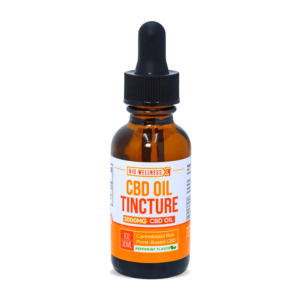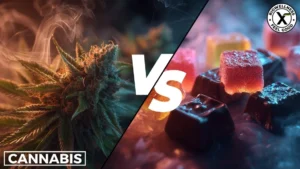key points
Cannabidiol, or CBD, has rapidly gained popularity as a natural wellness aid in recent years. Derived from cannabis plants, this compound is celebrated for its potential benefits, leading many to incorporate it into their daily wellness routines. However, it’s important to understand how CBD interacts with the body and whether it might have any side effects, such as headaches. In this article, we will look into the relationship between CBD use and headaches, examining current research, how CBD interacts with our body, and more.
Can CBD Cause Headaches?
As more research on CBD comes out, people often wonder if CBD can give them headaches. Even though most people tolerate CBD really well and don’t have any issues, some may feel a bit tired or get a headache. These side effects usually don’t last long, but there are things you can do to lower the chances of feeling them.
Choose Quality Products:
The quality of CBD products really matters. If you go for poor-quality CBD, they might have impurities or uneven CBD levels, which could lead to headaches and other unwanted side effects.
At BiowellnessX, we prioritize clean, natural ingredients and rigorous third-party testing to ensure product purity.
Start with a Low Dose:
Lastly, the amount you take is crucial. Since CBD affects everyone differently, there’s no one-size-fits-all dose. Overdoing it can lead to side effects such as headaches. Especially for CBD oil users, if you’re taking CBD oil and get headaches, start with 5 to 10 mg a day and increase gradually until you find the right dose. For CBD gummies, consider beginning with a half dose.
Our Natural CBD Relief Cream is a topical product, and it’s less likely to cause side effects because it doesn’t get into your bloodstream like other CBD products. This cream is made with a mix of top-notch natural ingredients that are meant to work together to give you the best soothing and cooling effects and get effective results for chronic physical aches and soreness. When you put this CBD relief cream on areas like your neck and shoulders that feel tense, it helps to chill out the muscles by working with the nearby endocannabinoids and receptors for some extra support.
Although there isn’t solid research linking CBD use to headaches, each person’s experience can vary. The product quality, your hydration level, and the dosage all play a role. Therefore, it’s wise to choose high-quality CBD products. Staying hydrated and starting with a low dose can also help. Gradually increase the dose until you find what works best for you.
What To Do if You Experience a Headache after Using CBD
If you get a headache after using CBD, don’t freak out. First, make sure you’re drinking enough water and staying hydrated. Then, consider lowering your CBD dose to see if it helps. Keep a log of your CBD use and any side effects to spot any patterns. If the headaches keep happening, stop using CBD and chat with a healthcare professional. Always listen to your body and get medical advice when you need it.
What Is CBD?
CBD is one of over 100 cannabinoids found in cannabis and hemp plants. Unlike THC, another well-known cannabinoid, CBD is non-psychoactive and will not produce a “high.” The CBD industry is rapidly evolving ab it has attracted significant attention for its potential to support various aspects of wellness and is available in many forms, including oils, capsules, balms, and gummies.
Types of CBD
CBD products come in three main varieties, each comes with its own set of benefits. Let’s explore:
Full-Spectrum CBD: Contains all the cannabinoids, terpenes, and other compounds found in the cannabis plant, including trace amounts of THC.
Broad-Spectrum CBD: Includes multiple cannabinoids and terpenes but has all traces of THC removed.
CBD Isolate: Comprises pure CBD without other cannabinoids or plant compounds.
CBD Extraction Methods
CBD extraction and manufacturing processes are crucial because they directly influence the quality of the final product. One of the most popular extraction methods is CO2 extraction, which uses pressurized carbon dioxide to extract CBD from the plant.
This technique is highly preferred since it leaves no residual chemicals in the CBD and preserves the full spectrum of cannabinoids and terpenes, key components of the hemp plant. However, it’s important to note that not all CBD products are made with the same level of quality. Due to the current lack of regulation, product quality can differ greatly. Some products may not contain the advertised amount of CBD, while others could be contaminated with pesticides or harmful additives. When selecting CBD products, it’s vital for consumers to be aware of these factors.
How Does CBD Work Within the Body?
The human body is fascinating, made up of different systems working together to maintain balance and harmony. Among these is the endocannabinoid system (ECS), which has recently caught the attention of scientists. This complex system consists of receptors, enzymes, and endocannabinoids—cannabinoids that our bodies naturally produce.
Discovered in the late 20th century, the ECS plays a crucial role in regulating functions like mood, appetite, sleep, and immune response. The system’s receptors, CB1 and CB2, are key players. CB1 receptors, primarily located in the central nervous system, influence functions like coordination and cognition. On the other hand, CB2 receptors are more commonly found in the peripheral nervous system and immune cells. This is where CBD enters the picture.
Even though CBD doesn’t directly attach to the body’s receptors like other cannabinoids, it interacts with the ECS in unique ways. By supporting the body’s own cannabinoids, CBD encourages their presence and influence. This interaction is thought to contribute to CBD’s potential wellness benefits. Researchers, medical professionals, and wellness enthusiasts are keenly interested in these possibilities. Ongoing research continues to explore the ECS and CBD’s role in it.
Causes of Headaches
Headaches are pretty common and can be caused by tight muscles in your head and neck or changes in brain chemistry. Lots of things can bring on a headache, like stress, not getting enough sleep, not drinking enough water, certain foods, skipping meals, or hormonal changes.
Stress
When you’re stressed, it can cause tension headaches, which are super common. These feel like a dull, aching sensation all over your head, kind of like there’s a tight band around your forehead or pressure at the back and sides of your head.
Sleep Issues
Insufficient and excessive sleep can lead to headaches, which typically resolve upon the establishment of a consistent sleep pattern.
Dehydration
One big reason for headaches is not drinking enough water. When you don’t drink enough water, your brain can temporarily shrink due to fluid loss, resulting in a dehydration headache.
Diet
Some foods and drinks like aged cheeses, processed foods, and alcoholic beverages can set off headaches for some folks. Also, skipping meals can make it worse because low blood sugar can lead to a headache.
Hormonal changes
Some people experience headaches and migraines during their menstrual cycle due to changing estrogen levels. The exact cause of these headaches isn’t always clear and may involve multiple factors, some of which could be serious. Identifying your specific headache triggers can be very helpful in managing and preventing this common issue. For frequent or severe headaches, it’s best to consult your doctor to determine the cause.
Can CBD Help Relieve Tension Headaches?
Tension in the head and neck can lead to discomfort and headaches. To ease this, you might consider regular exercise, stretching, meditation, or using wellness products like CBD. CBD’s potential to enhance overall wellness stems from its interaction with the endocannabinoid system (ECS).
Using CBD may help balance your body and improve your mood. It could promote relaxation and better sleep, which might alleviate tension and headaches. Research indicates that CBD may influence serotonin receptors in the brain, contributing to these benefits.
Serotonin, a neurotransmitter, is crucial for managing stress and mood. By interacting with this system, CBD may help maintain a sense of calm and balance. This, in turn, could reduce physical tension in the head, neck, and shoulders. Additionally, CBD’s role in the ECS might support normal muscle function, providing relief for those experiencing tension. Addressing these root causes, CBD might offer relief to some users.
Final Thoughts: Does CBD Cause Headaches
CBD is becoming a big deal in the wellness world because it’s said to help with lots of health issues. But it’s not all rainbows and butterflies. Some people might get a little headache, but it’s usually not a big deal. Just make sure to drink enough water, start with a low dose, and use good-quality products to help ease any side effects.
Just remember, everyone’s body reacts differently to CBD. What works for one person might not work for another, so it’s important to pay attention to how your body responds and make changes as needed. Also, more research is needed to understand how CBD affects headaches fully, so always check in with a medical professional before starting or switching up your wellness routine.

Legal Disclaimer:
By reading this information presented, you agree to release the author of any liability that comes from using this data. This post does not constitute legal advice. Claims about cannabinoids have not yet been approved by the Food and drug administration FDA. Read the full legal disclaimer here.
Other Articles That May Interest You
- Wellness gummies with Myrcene review
- Delta-8 vs CBD, what’s the difference?
- Is Delta-8 or CBD better for pain?
- Delta-8 edibles review
- Is Delta-9 legal?
- CBD for Vertigo – Discover the Potential
- Finding the Best CBN Gummies for Sleep Support
- What Are the Best Forms of CBN Available Today?
- Delta-9 THC Gummies Review
References:
- Hemp Production and the 2018 Farm Bill – 07/25/2019 | FDA
- The Controlled Substances Act (dea.gov)
- Hemp Production and the 2018 Farm Bill – 07/25/2019 | FDA
- The Controlled Substances Act (dea.gov)
- The cannabis Terpenes
- Cannabinoids and terpenes
- Therapeutic Efficacy of Cannabidiol (CBD)
- Cannabidiol in Anxiety and Sleep
- Cannabidiol use and effectiveness
- Harvard Health on CBD
FAQs About CBD and Headaches
There are various ways of ingesting CBD oil, including sublingually (placing it under the tongue for quick absorption), mixed into food or beverages, or in capsule form. Sublingual ingestion allows for faster absorption into the bloodstream, while mixing CBD oil into food or drinks may provide a slower release.
CBD oil is generally well-tolerated, but some users report experiencing headaches. This could be due to various factors such as high doses, poor-quality products, or individual sensitivities. If you experience headaches, consider reducing your dosage and ensure you’re using high-quality CBD oil.
The optimal CBD dosage varies by individual and depends on factors such as body weight, metabolism, and the condition being treated. It’s recommended to start with a low dose (e.g., 5-10 mg) and gradually increase it until you find the amount that works best for you. Consulting with a healthcare professional can also help determine the right dosage.
Residual solvents are chemical remnants from the extraction process used to obtain CBD oil. If not properly removed, these solvents can remain in the final product and pose health risks. High-quality CBD oils should be free from residual solvents, and reputable brands ensure their products are tested for purity.










